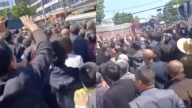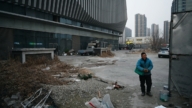【新唐人2014年04月30日讯】现在在中国,几乎所有城市的新空置房随处可见,购房者也寥寥无几,但新楼盘还依然不断的开工,房价也不断的升高。为什么中国的房地产泡沫越吹越大,目前还能维持不破灭呢?日前,中共国务院官员揭露了这个秘密。请看以下报导。
日前,国务院发展研究中心原副主任侯云春,在接受大陆《第一财经日报》的采访时表示,中国经过这么多年发展,房地产泡沫肯定存在,但房地产泡沫也不敢捅破,那样对经济带来的震动更大。
侯云春还认为,全世界新建的住宅,中国占了一半,虽然的确存在有人买不起房的问题,但中国房地产的主要矛盾不是房子太少,而是空房太多。所以,房地产行业如果下行,最好是逐步消化。
侯云春同时指出,经济繁荣时,房地产一定是重要因素之一;反过来,一个国家出现经济问题,特别是经济危机,房地产泡沫都是元凶。
北京《国情内参》杂志首席研究员巩胜利:“地方政府的财政,比如像南京、杭州、武汉、广州这些城市,地方财政的60%以上,都靠房地产的利润生存甚至活下去。”
北京《国情内参》杂志首席研究员巩胜利对《新唐人》表示,如果房地产一捅破,很多中共地方政府就会破产。
巩胜利:“像美国政府、欧洲的法制国家政府,它一般不超过4级政府,中国是7级。它7级还不说,它是双重党和政,两个财政在分,都在吃财政的饭。所以中国政府的成本是目前来讲,全球最高的。”
巩胜利指出,鉴于这种情况,中共的分税制规定,中央政府占税收的60%。这也是地方政府财政紧缺的另一原因。所以,作为摇钱树的房地产,中共政府会尽量想办法不让它破灭,否则就会遭受最大的经济危机。
根据国家发改委《城市和小城镇改革发展中心课题组》去年的调查,在12个省区的156个地级市和161个县级市,有90%以上的地级市,正在规划建设新城新区。此外,12个省会城市一共规划建设了55个新城新区。
但去年底,中国企业资本联盟主席杜猛披露,中国有6800万套空置房,楼市已经出现典型的“生产过剩”危机。
而且,很多城市的房地产资金链已经断裂。
最近媒体披露,被称为“中国曼哈顿”的天津滨海商务区,“开工项目已经烂尾30%,其他在建项目均已停工”。
今年2月,中共国务院副总理汪洋,在主持国务院部委主要负责人的会议上说,天津市已欠下五万多亿债务,实际上已经破产。天津子孙后代要承受这笔人为的债务。
美国中文杂志《中国事务》总编辑伍凡:“一捅破它那金融完蛋了,那整个市场完蛋了,那中共政权就要岌岌可危了。所以他们现在处在非常矛盾的现状、非常矛盾的状态。可是这个矛盾不是别人造成的,是共产党自己造成的。”
美国中文杂志《中国事务》总编辑伍凡指出,中国已经有上百个“鬼城”,“睡城”,但中共还在盖房子,房地产泡沫破灭不可逆转。
最近杭州、秦皇岛等城市房价不断下跌,被外界认为是房产泡沫破灭的开始。
中国经济学家谢国忠认为,中国房地产泡沫正在破灭,今年的房价会跌50%。
中国房地产最具影响力的评论家“牛刀”更指出,受钱荒影响,中国房价泡沫这次一定会破灭,必然是“拉美式”加“日本式”这两种模式的叠加,中国房价最少要跌去80%。
美国《华尔街日报》最近则披露,现在一些聪明的投资者开始抛售中国的房地产。
《华尔街日报》报导说,自去年9月份以来,被外界视为“超人”的亚洲首富李嘉诚,卖出了位于上海和广州的写字楼和商场项目,他的次子李泽楷在今年4月,也出售了位于北京三里屯的一处综合物业。
采访/易如 编辑/宋风 后制/李智远
Why None Dare to Pop the Property Bubble
Although China has massive empty housing stocks
in almost all its cities, few people are buying.
However, new residential buildings are still constantly
being built, and housing prices continue to increase.
Why has the housing bubble grown bigger and bigger
but still hasn’t burst?
A Chinese state council official recently revealed the secret.
In an interview with China Business News, Hou Yunchun,
Vice President of the State Council Development
Research Center said that China has been through so many
years of development, so a housing bubble certainly exists.
But Hou says it’s a bubble that cannot be allowed to burst,
otherwise, it would really shake the economy.
Hou says that China makes up for 50% of the world’s
new residential buildings.
Although some people indeed cannot afford the homes,
the main housing problem in China is not lack of property.
It is because of too many empty homes.
Thus, the best way to reduce real estate industry
is to do it gradually.
Hou says that when the economy was flourishing,
housing is one of the important factors;
on the other hand, when a nation’s hits economy problems,
especially economic crisis, the housing bubble is the major cause.
Gong Shengli, China affairs expert: “Housing interests make up
60% of the local governmental revenue in cities like Nanjing,
Hangzhou, Wuhan and Guangzhou."
Gong Shengli told NTD Television that if the housing bubble
is broken, many local governments will bankrupt.
Gong Shengli: “Government in the U.S. or European countries
has no more than four levels of administration,
but China has seven levels.
Besides the seven levels, the interests are again split between
the party and the government.
So the cost of keeping government in China
is the highest in the world."
Gong Shengli says that in this regards, the tax policy indicates
that the central government obtains 60% of tax revenue, and
it’s one reason why local government finances are insufficient.
Thus, with real estate industry being the money tree,
the central regime will try its best not let the bubble burst.
Otherwise, it would face the biggest economic crisis.
According to a survey by the National Development
and Reform Commission, 90% of 156 Chinese prefecture-level
cities are planning to build new residential districts.
In addition, 55 new districts were planned in 12 provinces.
At end of 2013, Du Meng, Chairman of China Enterprise
Capital Alliance revealed that
there were 68 million empty houses in China.
The residential buildings are overproduced.
Moreover, the capital chain of real estate in many cities
have been broken.
Recently media have reported that 30% of the projects in the
Tianjin Binhai Business District, known as “China Manhattan",
have failed to materialize, other construction projects
have been shutdown.
In February, Vice Premier Wang Yang said that Tianjin has
more than 5 trillion in debt, and in reality, it has gone bankrupt.
The future generations in Tianjin
will have to take on these man-made debts.
Wu Fan, US-based chief editor of China Affairs magazine:
“Once the bubble is broken, the finances will be done.
The entire market will collapse, the CCP will reach it’s end.
Thus they are in very conflicted situation.
Nevertheless, this conflict was caused by none other than
the CCP."
Wu Fan says there are hundreds of ghost towns in China, yet
the CCP still builds new houses; the bubble’s burst is inevitable.
Recently, housing prices have continuously dropped in
Hangzhou, Qinhuangdao and other cities.
Some observers say it’s a sign the bubble has begun to burst.
Chinese economist Xie Zhonghuo says that when China’s
housing bubble bursts, housing prices will drop 50% this year.
Chinese real estate commentator Niu Dao says that impacted
by the money shortage, the housing bubble will burst this time.
Niu says it will be like the Latin American and Japanese-style
collapse, and China’s home price will fall at least by 80%.
The Wall Street Journal reported that some wise investors
have begun to sell properties in China.
The report says that since September 2013, Asia’s richest man
Li Ka-shing sold his Shanghai office building
and shopping mall projects.
In April, his second son Richard Li sold the
Pacific Century Place building in Beijing’s Sanlitun area.
Interview/Yi Ru Edit/Song Feng Post-Production/Li Zhiyuan





























